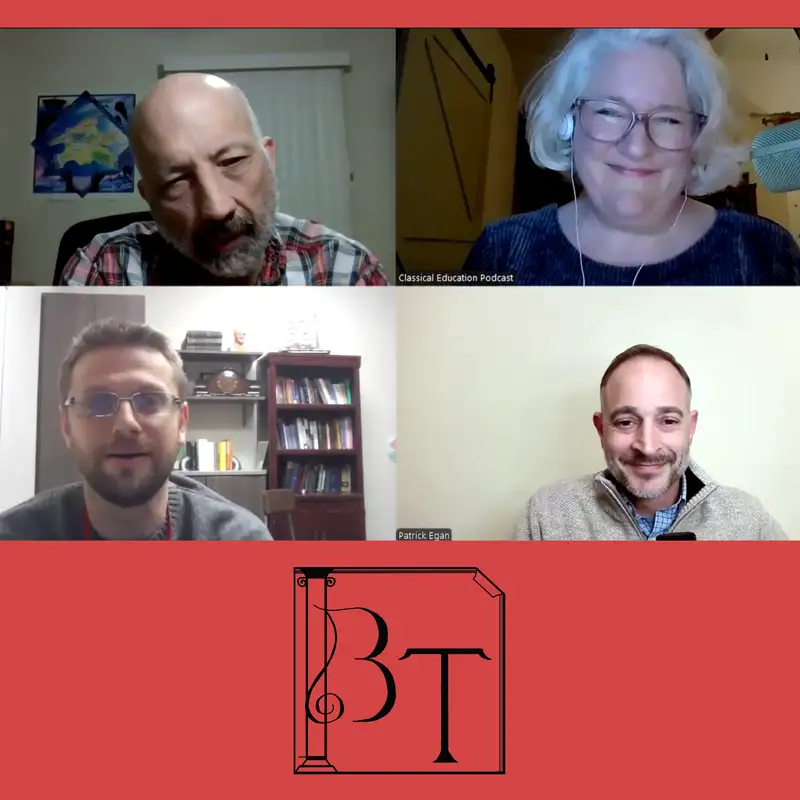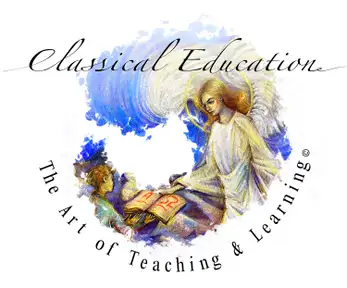Is Charlotte Mason Classical? Panel: Dr. Louis Markos, Dr. Patrick Egan, and Jason Barney
Guests
Dr. Louis Markos: Houston Christian University:
Dr. Louis Markos: Houston Christian University:
- Professor of English
- Robert H. Ray Chair in Humanities
- Scholar-in-Residence
Dr. Patrick Egan: Clapham Christian Classical School
- Academic Dean
- Contributor of Educational Renaissance
Jason Barney: Coram Deo Academy in Carmel, IN
- School Principal
- Author of Charlotte Mason: A Liberal Education for All (published by CAP)
- Contributor of Educational Renaissance
Show Notes
- Common misunderstandings of Charlotte Mason (especially if you only read her principles)
- What does Mason say about memory work and how does it compare to Dorothy Sayer's view?
- Who in the Romantic era is good that Charlotte Mason embraced?
- What did she reject from the Romantic philosophers?
- Various quotes from Mason that reflect her alignment to the liberal arts tradition
- What is her view of a child and how does it influence her pedagogy?
- How and why narration is classical and superior as a classical pedagogy
- What is Paideia? -- Does Mason have a paideia in her philosophy?
- How the habit training model of Charlotte Mason mirrors/agrees with the classical tradition
Resources Mentioned
The Great Books
John Locke, Coleridge, Wordsworth
Charlotte Mason: A Liberal Education for All by Jason Barney
For The Children's Sake by Susan Schaeffer Macaulay
Consider This: Charlotte Mason and the Classical Tradition by Karen Glass
Abolition of Man by CS Lewis
The Seven Laws of Teaching by John Milton Gregory
An Essay Towards a Philosophy of Education by Charlotte M. Mason (Centenary Expanded Edition has restored her original essay, "Two Education Ideals" where she compares Rousseau's Emile unfavorably to her favoring John Milton's Of Education)
Metalogicon by John of Salisbury
Institutes of Oratory by Quintilian
Charlotte Mason's Great Recognition of the Middle Ages through the fresco (vol. 2- Parents and Children by Mason)
Charlotte Mason Quotes
Louis Markos: "Our schools turn out a good many clever young persons, wanting in nothing but initiative, the power of reflection and the sort of moral imagination that enables you to 'put yourself in his place.'"- (Mason, Vol 6, pg. 25)
Jason Barney: "Almost anything may be made of a child by those who first get him into their hands. We find that we can work definitely towards the formation of character; that the habits of the good life, of the alert intelligence, which we take pains to form in the child, are, somehow, registered in the very substance of his brain; and that the habits of the child are, as it were, so many little hammers beating out by slow degrees the character of the man. Therefore we set ourselves to form a habit in the same matter-of-fact steady way that we set about teaching the multiplication table; expecting the thing to be done and done with for life. " (The History and Aims of the P.N.E.U. pamphlet)
Patrick Egan: "But the Florentine mind of the Middle Ages went further than this: it believed, not only that the seven Liberal Arts were fully under the direct outpouring of the Holy Ghost, but that every fruitful idea, every original conception, whether in Euclid, or grammar, or music, was a direct inspiration from the Holy Spirit, without any thought at all as to whether the person so inspired named himself by the name of God, or recognised whence his inspiration came." (Mason, Vol 2, pg. 271)
________________________________________________________
This podcast is produced by Beautiful Teaching, LLC.
Support this podcast: ★ Support this podcast ★ _________________________________________________________
Credits:
Sound Engineer: Andrew Helsel
Logo Art: Anastasiya CF
Music: Vivaldi's Concerto for 2 Violins in B flat major, RV529 : Lana Trotovsek, violin Sreten Krstic, violin with Chamber Orchestra of Slovenian Philharmonic
© 2025 Beautiful Teaching LLC. All Rights Reserved
The Great Books
John Locke, Coleridge, Wordsworth
Charlotte Mason: A Liberal Education for All by Jason Barney
For The Children's Sake by Susan Schaeffer Macaulay
Consider This: Charlotte Mason and the Classical Tradition by Karen Glass
Abolition of Man by CS Lewis
The Seven Laws of Teaching by John Milton Gregory
An Essay Towards a Philosophy of Education by Charlotte M. Mason (Centenary Expanded Edition has restored her original essay, "Two Education Ideals" where she compares Rousseau's Emile unfavorably to her favoring John Milton's Of Education)
Metalogicon by John of Salisbury
Institutes of Oratory by Quintilian
Charlotte Mason's Great Recognition of the Middle Ages through the fresco (vol. 2- Parents and Children by Mason)
Charlotte Mason Quotes
Louis Markos: "Our schools turn out a good many clever young persons, wanting in nothing but initiative, the power of reflection and the sort of moral imagination that enables you to 'put yourself in his place.'"- (Mason, Vol 6, pg. 25)
Jason Barney: "Almost anything may be made of a child by those who first get him into their hands. We find that we can work definitely towards the formation of character; that the habits of the good life, of the alert intelligence, which we take pains to form in the child, are, somehow, registered in the very substance of his brain; and that the habits of the child are, as it were, so many little hammers beating out by slow degrees the character of the man. Therefore we set ourselves to form a habit in the same matter-of-fact steady way that we set about teaching the multiplication table; expecting the thing to be done and done with for life. " (The History and Aims of the P.N.E.U. pamphlet)
Patrick Egan: "But the Florentine mind of the Middle Ages went further than this: it believed, not only that the seven Liberal Arts were fully under the direct outpouring of the Holy Ghost, but that every fruitful idea, every original conception, whether in Euclid, or grammar, or music, was a direct inspiration from the Holy Spirit, without any thought at all as to whether the person so inspired named himself by the name of God, or recognised whence his inspiration came." (Mason, Vol 2, pg. 271)
________________________________________________________
This podcast is produced by Beautiful Teaching, LLC.
Support this podcast: ★ Support this podcast ★ _________________________________________________________
Credits:
Sound Engineer: Andrew Helsel
Logo Art: Anastasiya CF
Music: Vivaldi's Concerto for 2 Violins in B flat major, RV529 : Lana Trotovsek, violin Sreten Krstic, violin with Chamber Orchestra of Slovenian Philharmonic
© 2025 Beautiful Teaching LLC. All Rights Reserved

